This month for my article I’d like to talk about being a good student. This is a topic that comes up quite frequently in our live feed on Instagram every Saturday night, usually starting with:
Is art education important and what kind (art school vs self directed)?
Like most answers to art related questions… it depends.
I went to school for a few years but didn’t graduate. I actually started working and worked myself out of school so to speak. I had a few honest teachers, maybe blunt is a better word here, that said “you might as well go and work since you’re already doing what you want to do and really, no one will ever care where you went to school if your portfolio is strong enough. If its not strong enough it won’t matter either.”
So my particular opinion is that I stayed in school long enough to learn how to learn and I actually think that may very well be the most important thing you can learn. It seems to be the first most insurmountable obstacle that people have to overcome. How many times have you heard “That’s so awesome… I could never do that.” How many times have we said it to ourselves.
But, if you can somehow, give up the idea that something is unattainable and yet still keep the (moderated) internal voice that says “That’s good for the moment but I could do it better next time.”(I say moderated because its very easy to slip from “I could do better” to “that’s just bad and I’m a bad artist.”) then you can teach yourself anything that you want to learn. You may find that you have potential access to abilities that you hadn’t considered. You, of course, may find your personal limitations as well…. I will never be a world class parkour athlete. My tendons don’t have the tensile strength at this point… but I could get better at it.
The other barrier to education whether academic or self directed is the feeling that “I’m already good enough! Anything people don’t like is just them not getting my style, etc.” I’m not saying you should never be satisfied with your work, but its like you’ve just climbed a mountain. Definitely, sit at the top, enjoy the view and have some s’mores… but what is that over there? Is that, yes it is a taller mountain I couldn’t see till I got to the top of this one and interestingly, metaphorically, I have to go down again and start in the next valley. Begin again.
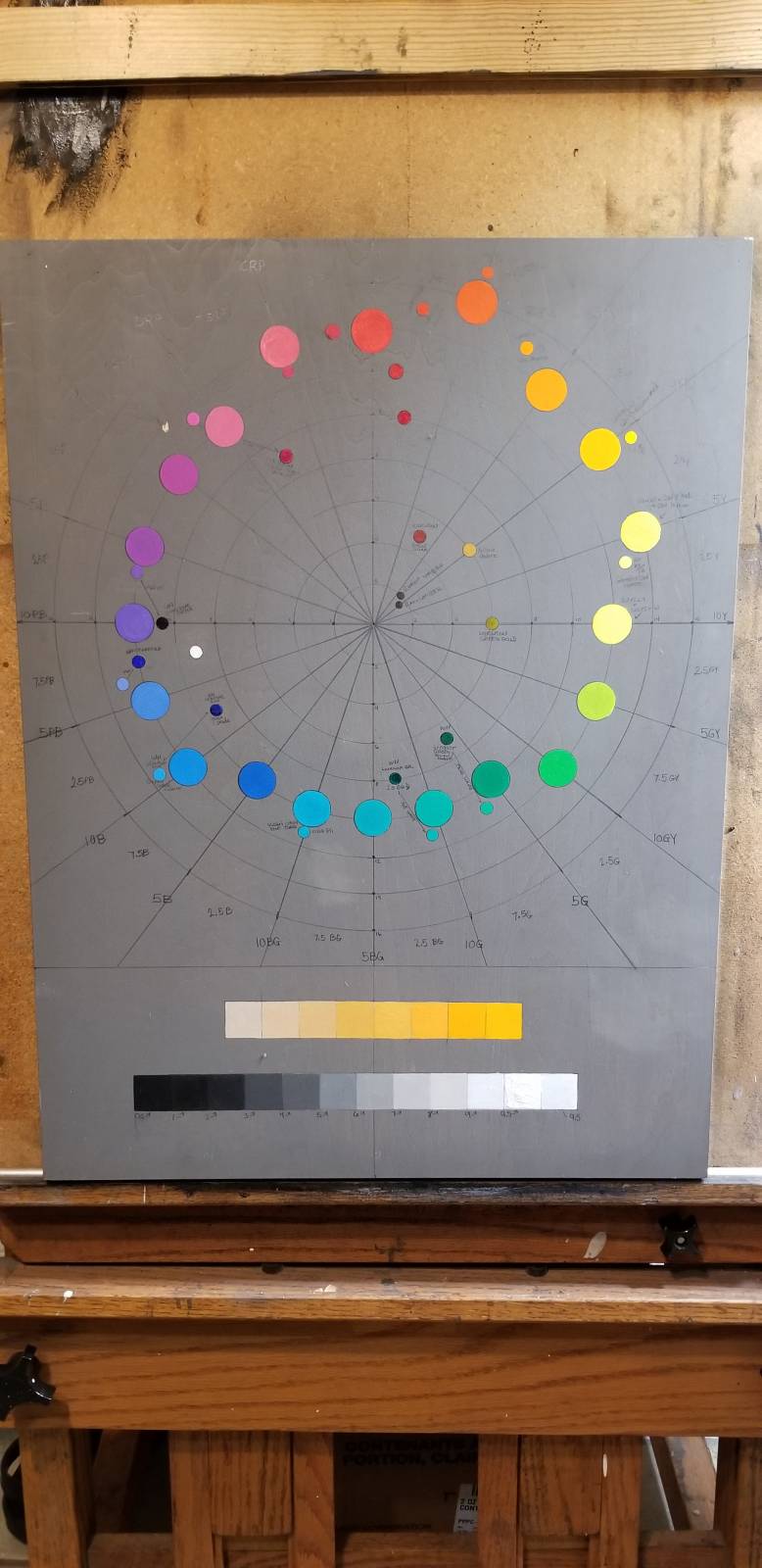
Allen Williams_Color wheel from Graydon Parrish’s Color Theory course at Bay Area Classic Artist Atelier
Never lose the beginner’s mind. You may have heard that phrase before. It’s very important.
Here’s another bit that I’ve discovered both in myself and in watching others. Be wary of understanding that comes too quickly. I’m not saying you won’t have brilliant flashes of insight when you get down to business, I’m saying that some things seem easy to understand but are actually quite difficult to achieve.
Here’s a quote about it: The wise, after learning something new, are afraid to learn anything more until they have put their first lesson into practice. -Laozi (paraphrased for neutrality)
Many times we intellectualize something, I mean we have a sort of virtual understanding that is quite a bit disconnected from a real world, tangible understanding of a thing. I relate this to martial arts… I can show you how to block a punch and you can replicate the action but that’s not the same thing as blocking a real punch thrown with intention at your real head. How many times have you watched a process video and thought it looked fairly simple. until you tried it and things just descended into madness and chaos. (This is where practical experience ie, practice, comes in.)
Most people quit when it gets hard. Simple truth but that’s why there are so few people operating at professional levels in any field (relatively speaking). The harder something is at the start the fewer people hold the line throughout. It doesn’t help that we live in a society that very often values speed over depth in terms of understanding. Maybe this is one of the reasons why we as a society are having a harder time reaching an understanding with each other… it bares further rumination.
The two values of practice, there are more but these two are my favorite:
A) Learn new things. Right? We practice, study, do master copies to learn new things.
2)Build calluses. This one, in my opinion, is the most valuable. When we practice we discover how hard it is to do a thing. Through practice the thing actually doesn’t get easier. We get used to how hard it is and eventually forget to notice how hard it is. It becomes “easy” because we’ve grown accustomed to the effort, gotten our calluses.
So here’s a challenge. Don’t think of practice as a thing you do until you get good, just let it be something that is always with you. If you say to yourself, “I will never stop practicing.” that “ten thousand hours” people talk about becomes a drop in the bucket.
Ok, so this is turning into a kind of bullet point list of things that I do to teach myself something, anything in general.
Start small. Learn one thing at a time. Do it till you have a physical understanding of it before being too anxious to leap to the next thing. When I started learning ZBrush (which is an ongoing process) I learned one simple sculpting tool and got extremely familiar with it. I did have a few people who gave me some tutorials in the basic program stuff but I forgot most of that until I needed to know it and then I had to go find the video or a different one and learn it again. So I had one tool, then, as I needed to, I added another. I didn’t try to learn everything at once. If I had done that I would have gotten overwhelmed and lost. I gave myself time and permission to learn it as I needed to. So now I get to do some 3D stuff when I do concept work and its starting, just starting, to feel as fluid as drawing with a pencil does to me. I should add, I’ve had the program since Version 3 (around 2007), so I think maybe 12 years give or take. I didn’t say I was a fast learner but I am pretty thorough.
I also want to say at this point that I’m not anti school. What I do advise against is the thinking that any one way is better than another, again as in martial arts, there is no martial art that is empirically better than another. The value of the art is wholly in the artist. As soon as you say “Tai Chi is a soft style that isn’t applicable to physical defense” someone comes along to show you how wrong you can be.
So the parallel, the value of the school is dependent upon the nature of the student. I feel that if I had known of such things as ateliers and art centered schools like SCAD I would have been better suited to start there than a liberal art school but at the time, 1984, my high school counselors had no idea what to advise me to do, so it was a liberal arts school. I did really well for about 2.5 years but soon lost interest as they seemed to want nothing but postmodern abstraction. That’s fine but it wasn’t me.
As it turned out I was much more suited to self directed education than formal academic courses. Granted if I had been in the right kind of school I may have gotten further faster, but I have never been one to rush a journey. I’m a person who loves the process of doing the work more than the piece that is produced in the end.
In the end being a good student means being sensitive to your wants and needs. If you’re the type that can watch someone do a thing and watch them well enough to pick up the nuances of their action you can get pretty far. Today there is very little that can’t be found online in regards to self education. I consider participating in IMC, Smart School, Schoolism, etc. to be self directed education and in my experience those are far more focused and tailored to an individuals specific needs and wants.
If you’re the type that thrives in a socially engaging classroom environment with a traditional academic approach then Liberal Arts Colleges and Universities will work for you. A great middle ground as I’ve mentioned art the Atiliers and Art specific schools like CCAD and SCAD.
At the end of the day though no matter which one you pick you will eventually find yourself in a self directed life. Learn to learn well and you will never lack for knowledge.
If you’ve ever been involved in a traditional martial art school you’ve heard this:
Once you’ve reached black belt (once you’ve graduated), now you know enough to begin really learning.
(Public Service Announcement…I am very much a nonviolent person despite my 30 years of Martial Arts. I am Nidan, Vicki is Shodan, Shotokan)


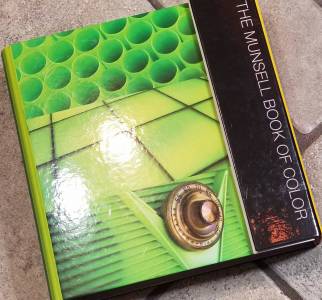
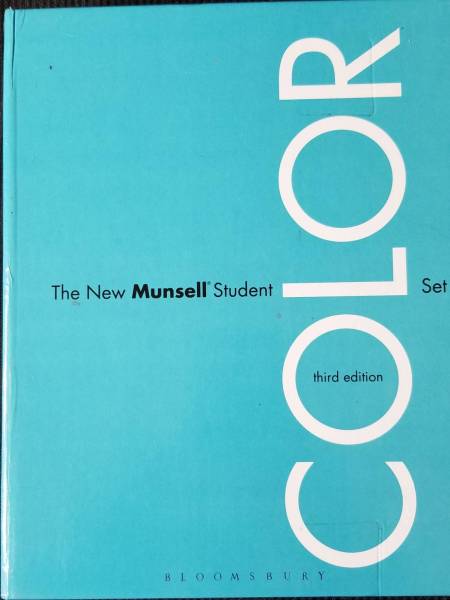


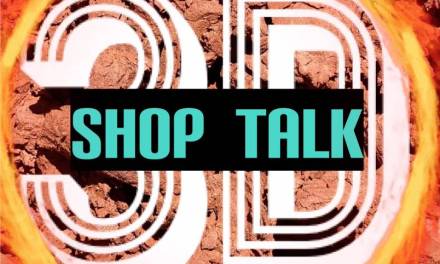
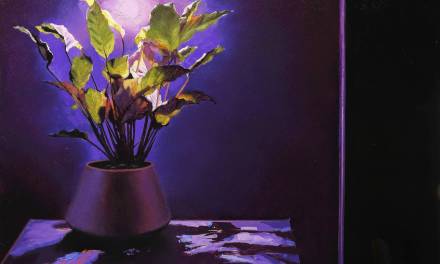
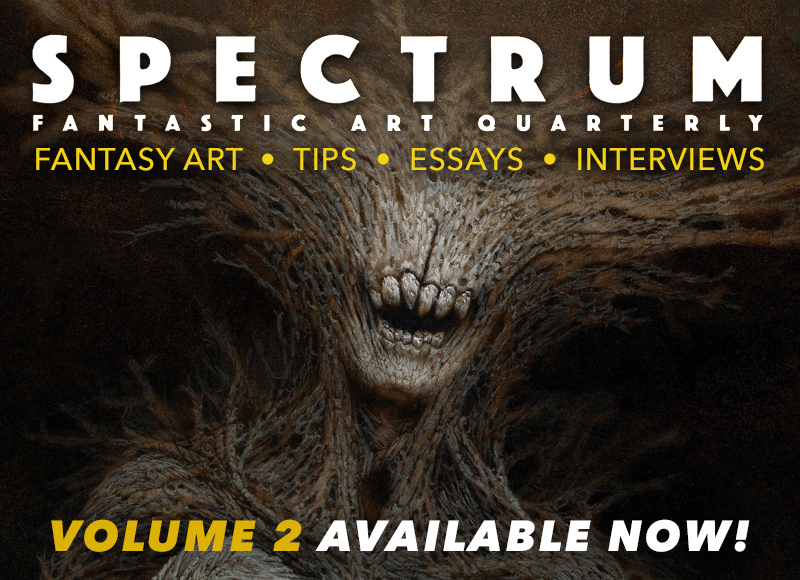
You’re the best Allen. Coming from a teacher of 30 years you hit the nail on the head with this post and you said it in a gentle, accepting way.
Thanks Bill, that’s very kind of you to say
I totally needed to hear this:) Thanks.
Learn how to learn. The most valuable thing right there, Thanks a lot!
A very relevant article for me. I also combined study and work, because my family had no money and I had to look for a way out. I was at the university during the day and at night I worked on a writing service, which you can find on Pick The Writer. I wrote essays for students to order. During several years of this work, I improved my writing skills and improved my grades on all essays and remained a good student. Times were difficult but interesting.
wow great https://www.muddycolors.com/2019/05/the-good-student/
Like any student, I was faced with the problem of writing an essay. I came across a very difficult topic that was beyond my strength. It’s good that I found an online service that helped me with my writing. And my work received the highest score.
Great article, Allen! The principles of continuous learning and self-directed growth you’ve outlined are crucial in many fields, including writing. As a writer working with Christian book publishers, I’ve seen how embracing a lifelong learning mindset can profoundly impact personal development and the depth of one’s work. Your approach aligns well with how we refine and polish manuscripts to truly resonate with readers.